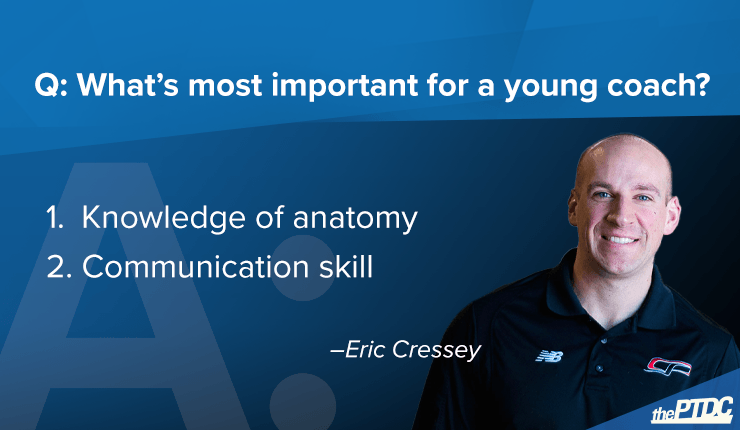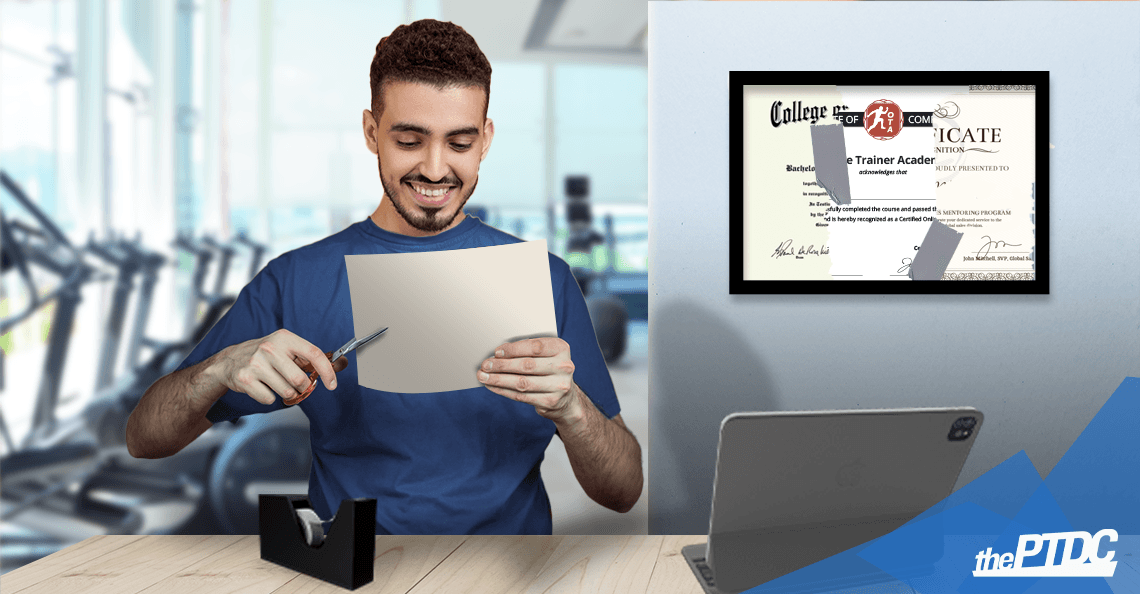You know the conventional path to a career as a personal trainer:
· Go to college
· Study exercise science
· Train a few students part-time
· Get a personal trainer certification
· Graduate
· Start your personal training career
That path was open to me, thanks to my privileged upbringing. But I didn’t take it.
Instead of going straight to college after high school, I took a gap year, which turned into two years, and used that time to get hands-on experience actually training people.
At my home gym in Vermont, I trained clients from 11 to 65 years old, individually and in groups, indoors and outdoors. I even trained two hockey teams (including my own) and completed a summer internship with a college team.
I became a competent, confident trainer, with a broad range of experiences, and I hadn’t even stepped foot on a college campus, other than to train athletes or drink on weekends.
Which brought me to the questions I’ll address here:
· What did I want to learn?
· How did I want to learn it?
· Who did I want to learn it from?
First, figure out what you want to learn
When we write training programs for our clients, we want to know the “why” behind every part of the plan. Why this movement instead of that one? Why this equipment and these progressions instead of the alternatives?
There’s not always a right answer to those questions, but there’s definitely a wrong one:
Because it’s what everybody else does.
So it is with a personal trainer’s education.
Going to college isn’t for everyone. It’s a huge investment of your time and resources. And if you do go, you have to decide if you want to do what’s expected and major in exercise science.
Yes, it’s the logical path. But it’s not the only option, or even the best option for every fitness professional.
The fitness industry isn’t like medicine or law.
You can become a certified and competent personal trainer with a high school diploma, as long as you combine real-world experience with continuing education and a network of colleagues you can talk to and learn from.
I know because I did it. In fact, it was through continuing education that I figured out what I needed to study in college.
Understand the two skills every coach must have
Three days before my 19th birthday, I went to a seminar at Cressey Sports Performance in Massachusetts. When I got a chance, I asked Eric Cressey this question:
“What are the most important skills for a young strength coach?”
“Two things hold back otherwise good coaches,” Cressey said. “One is anatomy.” It’s the foundation for everything we do as personal trainers.
That made sense, and I made a note to get an anatomy textbook as soon as I got home.
The next thing he said caught me by surprise:
“The other one is communication. On all fronts. Not just to explain exercises well, but to learn how to connect with people, and even how to write, because that will be key to getting your message out.”
Before that short conversation, I thought that whatever I studied in college would become my only real skill set, and what I would have to spend the rest of my life doing.
But after two years of waking up at 4:30 a.m. to train my first client at 5:30, I knew I didn’t want to go on this way for another year, let alone for the rest of my working life.
What I studied in college wouldn’t define who I am, or what I would become. It would simply be the next step in a life with enough steps to ascend to the top of the Empire State Building.

A brief Q&A session with the cofounder of Cressey Sports Performance changed the author's approach to education. (When we followed up with Eric Cressey, he told us doesn't remember the conversation, but agrees with the advice.)
Focus on what you don’t already know
I realized I didn’t want to study anything I’d learned by other means. Since I was already a competent trainer who understood the basics of anatomy and program design, I didn’t see how sitting in a classroom to learn it all again would make me a better coach.
Nor would it help me make the transition to a career that didn’t involve working long hours on the gym floor for years on end.
Instead, I focused on the other skill Eric Cressey had mentioned: communication.
Communication skills—selling yourself, writing copy, building an audience—give you tools to succeed not just in fitness, but in all kinds of businesses.
That was something I could envision myself refining in a classroom setting, where I’d be exposed to different ideas and ways of thinking while getting feedback from professors.
I found a program at New York University called the Gallatin School of Individualized Study, where every student has the freedom to explore their interests.
But it’s what I did before I enrolled in college that made the biggest difference in my life and career.
How to get a return on your investment in education
Whether you go to college or take another educational path, here’s what you should learn how to do:
· Think critically
· Engage in complex discussions
· Give presentations
· Support your ideas with evidence from research
· Put your ideas to the test by sharing them in the form of articles, posts, videos, or podcasts
Do you need to go to college to learn those things? No, but college provides an environment to foster growth in those areas.
Still, for some coaches, it might be better to take the money you would’ve spent on college and create your own education program.
That’s what I did in my two gap years.
I got certified through the Online Trainer Academy. I read all of Jonathan Goodman’s books. I attended seminars to meet and learn from industry leaders.
I also started a personal blog, and developed a love for sharing my thoughts with others even as I was refining those thoughts.
Questions to ask yourself before you invest in education
Going back to our initial questions:
1. What do you want to learn?
Put another way, what skills can you develop that make you better at something that matters?
What can you learn that will help you both in the fitness industry and beyond it?
Suppose, for example, that you love computer programming. Given how much technology we use these days, you would come into the industry with a skill every fitness business needs but few of us have.
Could you create new online personal training software? Or offer a service to help coaches scale their business with technology? I have no idea what other possibilities there are. All I know is that you’d have a uniquely valuable skill set.
2. How do you want to learn it?
Formal higher education isn’t for everyone. But it has one distinct advantage: the value of the degree.
You need one if you want a career as a physical therapist or athletic trainer. Most strength and conditioning coaches at the college and pro levels have at least a bachelor’s degree.
But unless you’re going into one of those specialties, don’t assume you have to get your degree in exercise science.
If somebody won’t hire you because you don’t have a certain degree, even though you have all the requisite skills for the job, do you really want to work for them?
3. Who do you want to learn it from?
What you learn, in or out of the classroom, is only one piece of the career puzzle. Professional relationships may be even more important.
With the money you would spend on college, can you hire an elite coach? Can you move to another city, or even another continent, to take an internship with a potential mentor?
There’s no education strategy that works for everyone
If you started reading with the hope that I would tell you exactly what educational path to follow, you’re probably disappointed right now. I have no simple, one-size-fits-all strategy. Nobody does.
There’s no wrong answer to the question of what you should study, or where you should study it.
Let your interests and curiosities guide you. Think about college within the context of all learning opportunities. Above all, make the decision that feels right for you.
And if you later decide it was the wrong decision? The good news is it wasn’t your final decision. You can learn from it, adjust, and continue forward in your career.
Nearly everyone's path is a jagged twist of mistakes, adjustments, and growth. Some of the most successful people in the world never went to college. Others started but then dropped out, switched majors, transferred, or took gap years.
When it feels right, you’ll know what steps to take.











